- Home
- Claudia Mills
You're a Brave Man, Julius Zimmerman Page 5
You're a Brave Man, Julius Zimmerman Read online
Page 5
That day, despite the heat, Julius decided he had better go to the library so he would have something to tell his mother if she asked. He loaded a remarkably cheerful Edison in his stroller, and off they went.
The library was air-conditioned. Every pore of Julius’s skin sang with relief as the cool air flowed over him. After the intense midday sun, his eyes took a moment to adjust to the dimmer light inside the library. When they did, he saw Lizzie Archer, curled up on a couch by the window, lost to the world in a book. On the couch facing her, watching him with her dark, amused eyes, sat Octavia Aldridge.
Should he go over and say hi? Julius practiced the line in his head: “Hi.” He decided against it. Instead he gave a quick, casual wave and briskly wheeled Edison over to the computer catalog. Luckily, Edison had fallen asleep on the way to the library. With any luck he’d sleep, poop-free, through the whole visit.
Julius typed in DICKENS, CHARLES. The guy had sure written a lot of books. He scrolled down until he found A Tale of Two Cities. Status: IN. Julius wasn’t surprised. Few people would consider A Tale of Two Cities summer reading. He turned from the monitor to find Octavia at his side.
“Hi,” he said, glad to have the line ready and rehearsed.
“Hi,” she said. “Comment ça va?”
Julius didn’t miss a beat. “Très bien, merci, et toi?” There was a word for how he must look, chatting away in French to Octavia Aldridge, and the word was debonair.
Or the word was idiotic.
But he did feel a twinge of pride at being able to respond to Octavia so promptly and smoothly in a foreign language. Taking French wouldn’t be so bad if he could actually learn some.
Octavia peered over his shoulder at the computer monitor. Then she looked at Julius, as if waiting for an explanation.
“My mom thinks I don’t read enough.”
“Your mom.”
Julius remembered that the last time he had talked to Octavia, he had told her that his mom had signed him up to babysit for Edison. He added, defensively, “My friend Ethan said it was pretty good.”
“Oh, it’s good,” Octavia said. “It’s great. Almost as great as ice cream. Speaking of which, do you want to go get some? Ice cream. As soon as you get your book.”
“Sure,” Julius said. Had she just invited him to go out for ice cream? She had just invited him to go out for ice cream. “I mean, sure.”
Five minutes later, A Tale of Two Cities wedged in the stroller next to a still-sleeping Edison, Julius and Octavia entered the ice cream parlor across the street from the library. At that moment an unpleasant thought occurred to Julius. He didn’t have any money. His earnings were stashed in a jar in his bureau drawer. All he had with him was fifteen cents.
“What’re you going to have?” Octavia asked. “I’m going to have a double scoop of black raspberry.”
“Actually…” Julius groped again, desperately, in his pocket. All he felt was the same dime and nickel. “I’m not that hungry.”
Octavia glared at him. “Then why did you say you’d go for ice cream?”
“Well, I thought I was hungry, but now … I’m not.”
He searched the menu board for anything that might cost fifteen cents. Then he saw it: water. This was one of the cheapskate places that charged people money for a lousy paper cup of water. “Maybe I’ll have some water.”
“Water? You’re going to watch me eat? And make me feel like a total and complete pig? While you drink water?”
It was time to start over again. “Actually,” Julius said, “I am hungry.”
“A minute ago you actually weren’t hungry, and now you actually are hungry?”
“I actually am hungry. But I don’t actually have any money. So can I borrow some?”
Octavia laughed. “No. This is my treat.”
Even though it charged for water, the ice cream parlor was a pleasant place, with frilly curtains and little old-fashioned wrought-iron tables and chairs. Julius and Octavia claimed a table by the window and pushed the third chair away to make room for Edison’s stroller.
Julius took a first lick of black raspberry ice cream. He didn’t usually go in for fruity flavors, but he had thought it was safer to order the same thing as Octavia. Of course, once he had ordered it, she had told him, “You don’t have to copy me.” It was good, though.
“My Oklahoma! audition is next week,” Octavia said after she had licked her cone down to a manageable point.
Julius thought about mentioning that he was going to be in a play, too, in French, no less. But he could tell it wouldn’t impress her.
“What part are you trying out for?” It seemed a good, low-key question to start off with.
“Laurey. That’s the lead. Ado Annie is a better part in some ways—you know, she’s the one who sings, ‘I Cain’t Say No’—but there’s a long ballet sequence for Laurey, and I can do ballet as well as regular stage dancing.”
“Do you think you’ll get it?”
Octavia gave him a withering look. “So far in my life, I’ve been to nine auditions, and I’ve gotten the part I’ve tried out for every single time.”
“Wow,” Julius said, since Octavia obviously expected some response along those lines. But as much as he envied her confidence, it made him a little uneasy, too. What if someday she didn’t get a part? He hesitated for a moment, then plunged in. “But nobody gets the part they want all the time.” Was that true? It sounded true. It sounded almost as true as the law of gravity.
“Maybe nobody does. But somebody could. Because it all depends on talent, and preparation, and being right for the part. I couldn’t get any part I tried out for, but if I pick parts that I’m suited for—like Laurey—and prepare like crazy for the audition, which I’ve been doing, then I’d say my chances are pretty good.”
“But what if two people are both suited for a part, and they’re both really talented, and they both prepare like crazy?”
“Well, obviously only one of them can get it.” Octavia sounded impatient at having to explain such an elementary point to Julius. “All I’m saying is that so far that’s never happened to me. I want things more than other people want them, and I’m willing to do what I have to do to get them. Your cone is dripping.”
Julius caught the drip with his tongue and for the next minute concentrated on licking his cone. There was no point in trying to challenge Octavia’s confidence in herself, and he wasn’t even sure why he wanted to. Except it couldn’t hurt to consider the idea that sometime in your life something might not work out the way you wanted it to. Julius’s own operating principle was that things would never work out the way he wanted them to.
“So why do you like acting so much?” he asked, hoping he was retreating to safer territory. He expected Octavia to toss back some scornful reply, but instead she seemed to be genuinely considering the question.
“Well, partly it’s that I like plays so much. I still remember the first one I ever went to. South Pacific. I was only four, but one of the teachers in my preschool was in the chorus, so my parents took me, and when the curtain went up … it was magic. It was like having a magic ring that could take you to another time and place. And the music. Those songs. My parents bought me the CD of the first Broadway production, and I learned all the songs by heart, with the same motions I’d seen on the stage. My parents thought it was funny, and they’d put the CD on when their friends came over and have me do my version of ‘Some Enchanted Evening’ and ‘There Is Nothin’ Like a Dame.’ And their friends would all clap for me, and I’d curtsy, and I knew that this was it. This was what I wanted to do with my life.”
Octavia stopped. For the first time since Julius had met her, she looked self-conscious. “I bet you didn’t expect a speech. Believe it or not, I don’t always talk about myself this much. So what about you? Do you have a first memory of something like that?”
Julius tried to think of a memory to match Octavia’s. But he knew he had nothing. “Nah,” he said.
Julius thought back. His family had moved into their current house when he was three and a half, so any memory of their first house had to be an early one.
“I remember the garage. Our house now has an automatic garage-door opener, but our first house, when I was really little, didn’t have one, and I remember my mom getting out of the car and bending down to lift the door and how it came rolling right up.”
Octavia stopped licking her cone. “Your first memory is of your garage door?”
Okay, it wasn’t much compared with Octavia’s memory of South Pacific. But she had asked for his first memory, and that was what he had come up with.
Another memory, dimmer than the garage door, began to form.
“Wait a minute. There was a little kid on our street, and there was something wrong with her, or something.” It was strange recalling a memory, like watching a picture develop on a Polaroid snapshot. “It was her eyes. They didn’t look in the same direction. One of them always turned in. And this other kid—Jimmy—Jimmy Jardullo—he was laughing at her, and she was crying, so I punched him in the stomach, and I got put in time-out for hitting him, but he didn’t get put in time-out for making her cry. I guess my mom thought I felt like punching people in the stomach that day.”
Julius stopped. The memory, when it had finally come, had been so vivid, so real. He looked sheepishly at Octavia. “I bet you didn’t expect a speech, either.”
“I like your memory,” she said softly.
“I like yours, too.”
Julius heard a howl. Edison was awake, pointing at the remains of Julius’s soggy, dripping cone. “Edison wants ice cream!”
“Okay, buddy, calm down, I’ll get you some ice cream.” He felt in his pockets for his money, then remembered. “Or how about some water? A nice cool cup of yummy water?”
“Edison wants ice cream!”
“Julius.” Octavia touched his hand. “I said, this is my treat. What kind of ice cream do you want, Edison? Julius and I had black raspberry.”
“Not raspberry.”
“How about vanilla?” Julius asked.
“Not vanilla.”
“Listen, buddy,” Julius said, “I’ll read you the whole list and you pick. Ready? Vanilla.”
“Not vanilla.”
“Chocolate.”
“Not chocolate.”
“Strawberry.”
“Not strawberry.”
Edison had vanilla. It dripped all over him, and all over the stroller, and all over the plastic cover of A Tale of Two Cities, but Julius didn’t care. He felt too good to care about anything.
8
“How are you coming along with A Tale of Two Cities?” Julius’s mother asked him Sunday afternoon, as she was fixing potato salad for a family barbecue that evening.
“Well, I got the book,” he said. “From the library,” he added, watching the hopeful look fade from her eyes. “I didn’t get a chance to go over there until Friday.”
“Honey, we have the book. It’s right there on the bookshelf in the living room.”
She put down the mayonnaise spoon and led Julius to the living room, where one whole wall was lined with bookshelves from floor to ceiling.
“Here, with all the other Dickens novels.” Sure enough, there was A Tale of Two Cities, flanked by David Copperfield and Great Expectations. “I still remember how long I worked when we moved in to get our books arranged. I had always wanted to live in a house with a library, a real library, the kind with a little moving ladder that rolled from shelf to shelf. I think that’s what sold this house to me, all the built-in bookcases.”
But there was no moving ladder. Maybe Julius would save his Edison Blue money and buy her one for Christmas. He’d like a moving ladder himself. He would have had a wild time riding on one when he was a little kid.
“Don’t you ever browse here?” Julius’s mother’s tone had shifted from nostalgia to worry. “When I was a child, I read every book my parents owned; I think I read half the books in our tiny public library. And now we have a house full of books, and I sometimes wonder whether you even look at them.”
Julius tried to think of something to say to make her feel better. It was true that his mother’s books had never had any appeal to him. There were so many of them, all lined up in those long, straight rows, like the army of statues from a dead emperor’s tomb he had seen once in the museum. He knew his mother wished he were a reader like—the thought came to him—Lizzie Archer. He could imagine the little squeal of delight Lizzie would give if she ever saw the Zimmermans’ books. His mother should have had Lizzie for a daughter. Instead she had Julius for a son.
“I look at them,” he said. He looked at the books every day; he just never looked inside them.
As Julius headed upstairs to try to read at least the first chapter of A Tale of Two Cities before dinner, he heard his dad say to his mom, “Times have changed, Cindy. A lot of kids today aren’t readers.”
Julius knew he shouldn’t linger at the top of the stairs, but he couldn’t help himself. It felt good to hear his dad taking his side.
“There’s still nothing like a book,” his mom said sorrowfully. “You can’t curl up on the couch with a computer. And plenty of kids still read. Ethan read A Tale of Two Cities last winter.”
Julius should never have told her that.
“It just breaks my heart that Julius doesn’t read.” Julius could hear the despair in her voice. “When you love something, you can’t help but hope your children will love it, too. And children who read do better in school. It’s a proven fact. They do.”
“But these days, even in schools, kids are watching TV and using the Internet,” Julius’s dad said gently. “They get their information in other ways.”
“Tell me,” his mother said, “how much information does someone get from The Flintstones?”
“Well, maybe he learns something about the Stone Age.”
His dad laughed and, to Julius’s relief, his mom laughed, too. Upstairs in his room, he opened his library copy of A Tale of Two Cities. “It was the best of times, it was the worst of times.” That sounded like a dumb first line to Julius. Best and worst were opposites. If it was the best of times, it couldn’t be the worst of times. What kind of book began with an outright contradiction?
Julius closed the book. He’d pick it up again later, when his mother’s look and tone of disappointment weren’t so sharp in his memory.
* * *
After dinner, instead of starting in right away on A Tale of Two Cities, he made his goals list:
Goals for the Week of June 23–29
1. Don’t go out without money.
2. Don’t disgrace yourself in French class.
3. Don’t put off reading A Tale of Two Cities.
4. Don’t let Edison poop in his diaper again—VERY IMPORTANT!!!!
Even Julius had to admit that the list was pathetic. Octavia’s list—he was sure she had one—would say “Astonish them at the audition for Oklahoma!” or “Memorize all the lines of all the heroines in Shakespeare.” Julius’s goals were all negative: don’t do this, don’t do that. It was as bad as the list of rules posted by the side of the pool.
He decided to rewrite the list, making it more positive.
Goals for the Week of June 23–29
1. Carry money with you—at least $2.00.
2. Do your best in French class.
3. Read one chapter a day of A Tale of Two Cities.
4. Toilet-train Edison Blue????!!!!
The new list looked more impressive. It also looked impossible. Toilet-train Edison Blue? Who was he kidding?
Julius took a five-dollar bill from his Edison Blue jar and stuffed it in the pocket of the jeans he had tossed on the bottom of his bed, the jeans he would wear tomorrow. There. He had already taken care of goal number 1. But goal number 4 was the killer. Goal number 4 was a killer and a half.
* * *
When Julius and Ethan arrived at Intensive Summer Language Learning on Monday morning, their classroom had been transformed into an art museum. Every wall was covered with reproductions of what Julius supposed were great works of French art. He couldn’t help but notice that some of the great works of French art featured female persons wearing few, if any, clothes.
“Ce vendredi, this Friday, we will go to le musée d’art, the museum of art, in Denver, to see an exhibit on l’impressionnisme français, French Impressionism,” Madame Cowper announced. In her funny mixture of half French, half English, she went on to say that, after touring the exhibit, they would have lunch at a French restaurant; the class would run until three that day. Then Madame Cowper handed out permission slips for the trip, luckily in English.
Julius’s first thought was: Edison Blue. Would Mrs. Blue be able to find someone else for that afternoon? Would Edison miss him? Or would he cling as hard to the new babysitter’s leg when it was time for him or her to go? Julius was surprised that he almost minded the thought of skipping work. Anyone in his right mind would be overjoyed at the thought of an afternoon without Edison Blue.
Madame Cowper spent the first part of the class talking about French art. One by one, she told the class about each of the pictures displayed in the classroom, even the pictures of the ladies with no clothes on.
“And this is Odalisque, by Jean Auguste Dominique Ingres,” she said, pointing to a portrait that showed a whole entire naked lady, mostly her back, but one little bit of her front. “Note the exquisite sense of color,” Madame Cowper said. Julius chiefly noted the use of a lot of skin tones.
“What happened to her clothes?” Alex called out.
To her credit, Madame Cowper didn’t blush. “De l’antiquité, the human body has always been a favorite subject for les artistes.”
As Madame Cowper turned to the next picture, Alex shot a rubber band across the room at Odalisque. It hit her square on the backside with a loud ping.

 Standing Up to Mr. O.
Standing Up to Mr. O.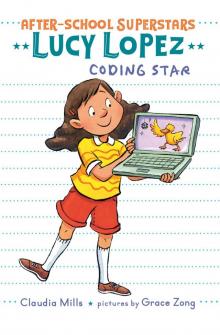 Lucy Lopez
Lucy Lopez Dinah Forever
Dinah Forever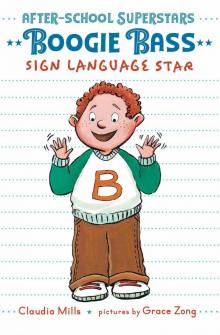 Boogie Bass, Sign Language Star
Boogie Bass, Sign Language Star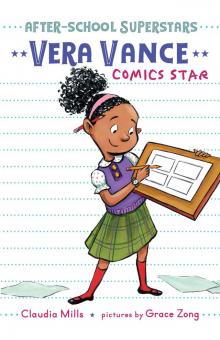 Vera Vance: Comics Star
Vera Vance: Comics Star Izzy Barr, Running Star
Izzy Barr, Running Star You're a Brave Man, Julius Zimmerman
You're a Brave Man, Julius Zimmerman Nixie Ness
Nixie Ness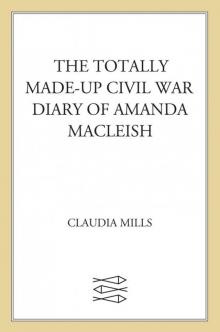 The Totally Made-up Civil War Diary of Amanda MacLeish
The Totally Made-up Civil War Diary of Amanda MacLeish Basketball Disasters
Basketball Disasters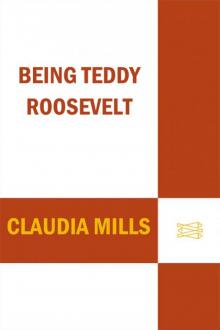 Being Teddy Roosevelt
Being Teddy Roosevelt Losers, Inc.
Losers, Inc. The Trouble with Friends
The Trouble with Friends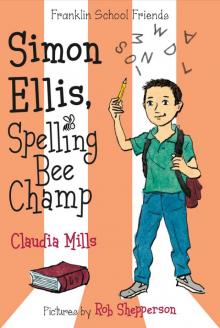 Simon Ellis, Spelling Bee Champ
Simon Ellis, Spelling Bee Champ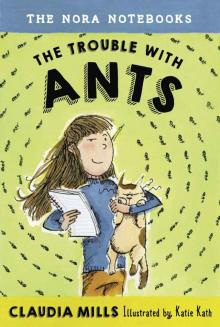 The Nora Notebooks, Book 1: The Trouble with Ants
The Nora Notebooks, Book 1: The Trouble with Ants Annika Riz, Math Whiz
Annika Riz, Math Whiz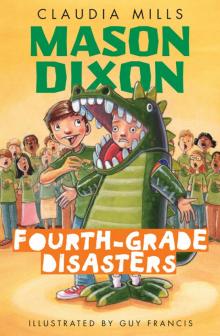 Fourth-Grade Disasters
Fourth-Grade Disasters Pet Disasters
Pet Disasters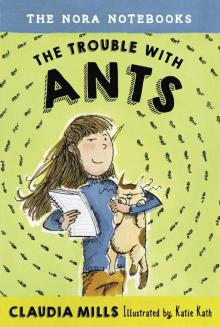 The Trouble with Ants
The Trouble with Ants Write This Down
Write This Down Alex Ryan, Stop That!
Alex Ryan, Stop That!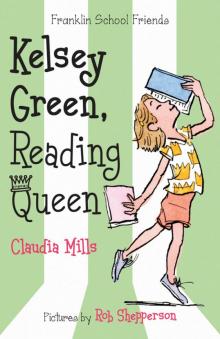 Kelsey Green, Reading Queen
Kelsey Green, Reading Queen How Oliver Olson Changed the World
How Oliver Olson Changed the World Lizzie At Last
Lizzie At Last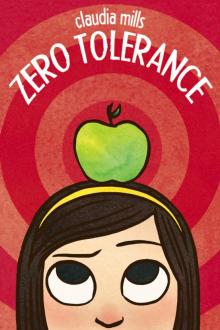 Zero Tolerance
Zero Tolerance The Nora Notebooks, Book 2
The Nora Notebooks, Book 2 Cody Harmon, King of Pets
Cody Harmon, King of Pets Fractions = Trouble!
Fractions = Trouble! Makeovers by Marcia
Makeovers by Marcia One Square Inch
One Square Inch